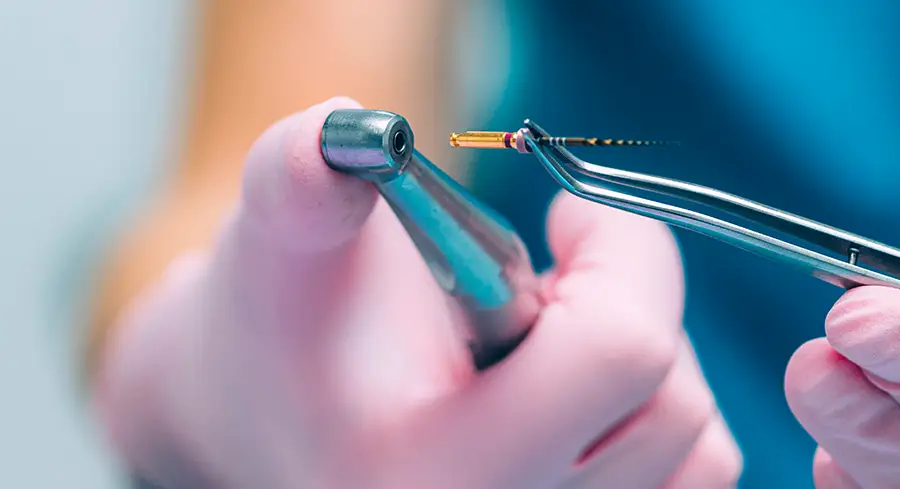Here we go again: that sharp, throbbing sensation in your mouth. You know, the one that’s accompanied by a bad taste and the smell of tooth decay.
You can endure the pain up to a point, but after the longer you go on, the harder it gets. In fact, you can feel it getting worse, with your dental pain even turning into headaches every time you bite.
Severe cases of tooth infection can result in issues like this, as well as leading to your teeth becoming black and discoloured.
If you think that removing the affected tooth is the only solution to your pain, you’re in luck, because there’s another way to save and repair a decayed or infected tooth.
Specifically, we’re talking about root canal treatment.
Is root canal best for me?
In many cases, tooth decay can end up wearing through the enamel layer of your teeth, exposing the sensitive insides to infection from all of the bacteria in your mouth. When they reach the nerve and pulp of your teeth, this can cause:- Inflammation and infection
- Discolouration
- Pain and sensitivity
How is root canal treatment done?
Your initial consultation with an emergency dentist in Armadale is when we determine the solution to solve your tooth decay or tooth sensitivity. An overly painful tooth may cause discomfort – that’s why it is best to visit our dental clinic in Armadale right away. After your digital x-ray, your Armadale dentist can perform a root canal consultation, which is where they evaluate how far the infection has spread and determine whether or not root canal is appropriate for dealing with your infection. And if it’s decided that this is the way forward, your dentist will organise to go through a root canal procedure. What does that involve?1) Pain relief
Anaesthesia is first given to make you feel more comfortable with the procedure. Even though in many cases the nerves are already dead, it’s important that local anaesthetic is administered anyway.2) Cleaning and disinfecting your tooth
Once the anaesthetic kicks in, it’s time to remove the infection. After drying and disinfecting your tooth, the work begins. Your dentist will remove the bacteria and infected nerve tissue until everything has been removed, after which it’s time for your tooth to be thoroughly cleaned and disinfected using a calcium hydroxide solution that kills any remaining bacteria inside your tooth. During this process, your dentist may place a rubber dam around the tooth to protect you from swallowing any fluids or byproducts, while also preventing saliva from entering your tooth while they’re at work (and thereby preventing infection).3) Sealing
After all the cleaning and disinfecting, your tooth will be left open. To manage this and reduce the risk of infection, your Armadale dentist temporarily seals that part of your tooth. In addition to sealing your tooth and covering up the evidence of tooth decay, this also protects what’s left inside your tooth. Afterwards, you may be prescribed an antibiotic to help protect your tooth from further infection.Root canal FAQs
How long after a root canal should you get a permanent restoration?
Depending on the extent of your tooth condition, it may take two dental visits or more to undergo the final root canal treatment stages where your teeth are sealed with a filling. As a general rule, there’s usually a two-week period between your root canal first stage, and the root canal second or final stage. The permanent restoration may be placed after the second stage or root canal treatment or even several weeks or months later. It is a balance between healing and strengthening the tooth.How can I strengthen my teeth after a root canal?
Once your infected tooth is finally sealed, your Armadale dentist might advise you to consider further restorative dentistry procedures such as dental crowns in Armadale to protect and further strengthen your weak teeth. In addition to strengthening your teeth, this can add extra protection, reducing the chances of dealing with future infection even further (just remember to keep up with your dental hygiene in the meantime).Why would a tooth hurt after a root canal?
Discomfort in the immediate aftermath of root canal treatment is normal. You may continue to feel a mild tenderness and discomfort for up to a week following your root canal procedure. Luckily, over-the-counter pain relievers can help with this. However, if you continuously feel the pain for more than a week, then it is best to arrange a follow-up with your Armadale dentistry right away. This can even be a sign of root canal infection, requiring you to visit your emergency dentist in Armadale right away.Can a tooth get reinfected after a root canal?
A tooth that undergoes root canal treatment will heal independently and should be pain-free after some time. However, this may not be the case – in some rare cases, a tooth may become reinfected, especially if the temporary filling comes loose. You will need to visit your Armadale dentist if you feel the following symptoms:- Tenderness in your swollen tissue
- Pain
- Infection
- Bad taste in your mouth

